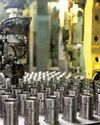Whether he is a TV chef or a “real” restaurant chef, the image of the chef sells products, if not necessarily his restaurant!

At a posh Delhi school recently, almost 70 per cent of class IX students, when asked about their career preferences, said they wanted to be chefs! This is a true incident narrated by a parent. It is not as shocking as it sounds — at least not to those of us who’ve been tracking India’s food story.
To cook is the new cool. To be a chef, the new celeb. The profession is seen increasingly as a glamorous choice — regardless of the realities of manning a professional kitchen. But more importantly, the chef is also a brand: An increasingly marketable commodity.
The rise of a culture where food is entertainment has completely revolutionised the image of the chef. From being the taciturn, backroom boy, the chef is now the face of many businesses — not necessarily restaurants, though. He can sell everything from sugar-free supplements to kitchen equipment and luxury cars. So much so that sometimes he does not sell his food at all! Amidst this, TV chefs vs “real” restaurant chefs has to be the hottest debate these days. But before we jump in, let's take a look at the business of being a chef on reality TV.
The paradigm is simple: TV chefs have large followings, get mobbed by women and children, have huge followings on social media, cut book deals, and now garner fat endorsement fees too. If Sanjeev Kapoor was India’s first chef to build an empire based on his popularity as a marketable face, in the last five years, others have followed suit.
This story is from the {{IssueName}} edition of {{MagazineName}}.
Start your 7-day Magzter GOLD free trial to access thousands of curated premium stories, and 9,000+ magazines and newspapers.
Already a subscriber ? Sign In
This story is from the {{IssueName}} edition of {{MagazineName}}.
Start your 7-day Magzter GOLD free trial to access thousands of curated premium stories, and 9,000+ magazines and newspapers.
Already a subscriber? Sign In

MEMORIES & IMPRESSIONS
Ratan Tata was an exceptional human being. He was a visionary leader, esteemed industrialist, and a humanitarian, who left an indelible mark on India and the world.

The Robotaxi Market
The robotaxi market is shaping up to be a high-stakes battleground as tech giants and automakers race to transform urban mobility.

And the Nobel Prize Goes to AI
The recent Nobel Prize T awards to AI pioneers affiliated with Google have sparked a broader conversation about Big Tech's influence on research and the limitations of traditional prize categories.

Ola Electrified
Once considered a trailblazer in India’s electric vehicle (EV) ecosystem, Bhavish Aggarwal’s Ola Electric now faces a major accountability crisis.

Sharp Slide in Industrial Output on Eve of Deepavali
India’s index of industrial production (IIP) saw a sharp reversal in August, contracting by 0.1 per cent, in stark contrast to the 4.7 per cent growth in July, mostly because of significant contractions in mining and electricity generation.

Heralding the Solar Era with Sustainable Electrification
RAJEEV KASHYAP on the economics of solar power, the hurdles in scaling it, and much more

A WELL-GREASED MACHINE
The OmniBook X14 laptop runs on first-generation Snapdragon X Elite, which bets big on Al-enabled productivity and battery life, but falls short when it comes to overall experience, says Deep Majumdar

DO NOT LETA HEALTH CRISIS RUIN YOUR FINANCIAL HEALTH
For a family of four living in a metro, it is recommended to opt for a family floater health insurance plan with a sum insured of at least Rs 15-20 lakh

Disruption Ahead: Beyond Organisation Charts and Structures
ALBERT EINSTEIN FAMOUSLY said, “We cannot solve our problems with the same thinking we used when we created them.

Dr. Rahul Shivajirao Kadam: A Visionary Leader Blending Sustainability, Innovation, And Social Empowerment
We are on the stage of global warming, and these technologies not only help prevent further damage but also leave behind a better environment for future generations.